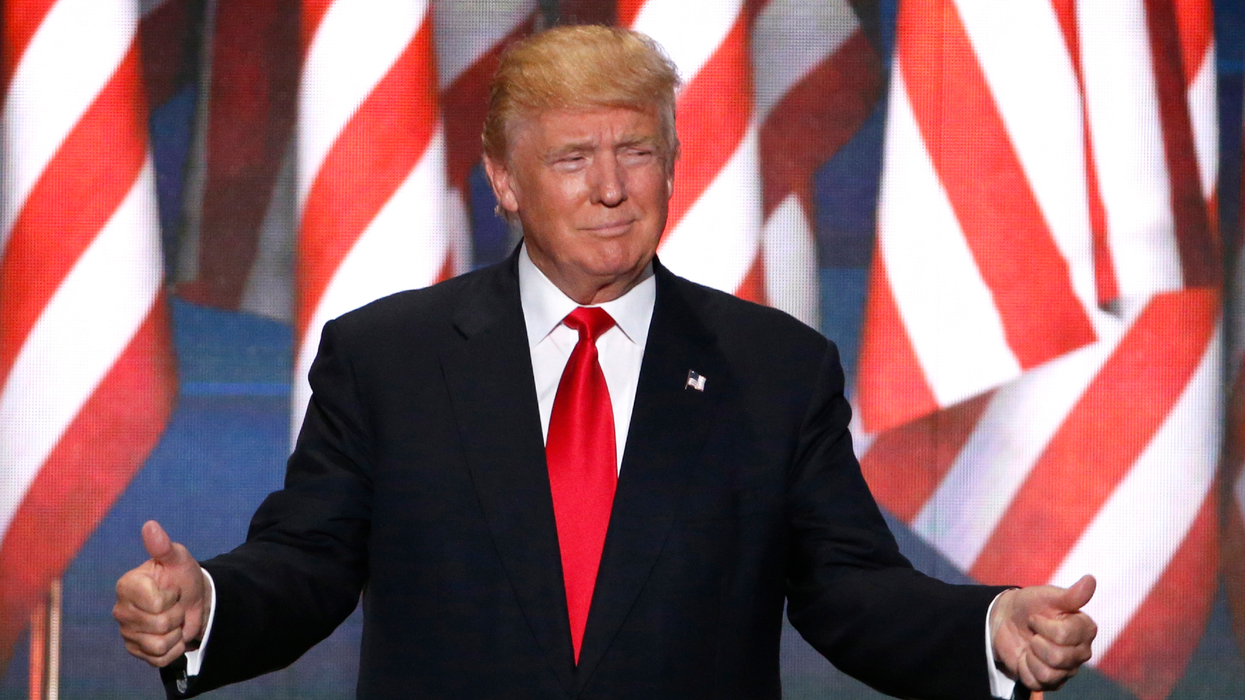On Sunday, one of the most damning reports on Donald Trump, his presidency and his taxes was published by the New York Times.
The revelations which revealed that Trump paid just $750 in 2016, the year he became president, as well as 2017 and none for the decade prior has already be dismissed by the man in question as 'fake news.'
While he might feel that reeling off cliched catchphrases will admonish him from any wrongdoings, the fact is that this report could be very damaging for Trump, with just over a month before Americans take to the polls.
Trump's taxes have long been a topic of discussion but until now nobody, apart from the man himself knew what they looked like but now they are out in the public for the entire world to see and there is a lot to talk about.
So, without further ado here are ten of the most notable talking points.
Trump pays almost no tax
The report took a look at 18 years of Trump's taxes and in 11 of those 18 years, Trump paid no federal income taxes whatsoever. According to the Times, Trump seemingly managed to do this by having his companies cover the costs by what would be considered by many as personal expenses.
In 2017, he paid just $750 in taxes whereas as his two predecessors in the White House, Barack Obama and George W. Bush, both paid more than han $100,000 a year while in the job. The irony of this, despite it being very suspicious behaviour, is that Trump has spent most of his presidency introducing tax cuts which have benefited the elites of the United States.
His businesses used to lose a lot of money
Above all else, Trump has prided himself on being a great businessman who knows how to get great deals and make money. His real estate empire, golf courses, casinos and various other ventures helped him become a household name in the United States but it has been well documented that many of these businesses have ultimately failed, leading to Trump filing for bankruptcy six times between 1991 and 2009.
However, the amount of money that Trump has lost in this time is actually staggering. The Times report that since 2000, Trump's gold courses alone have lost $315 million with most of that coming from the Trump National Doral in Florida. In addition, his hotel in Washington has reportedly lost $55m. The newspaper added:
Trump’s core enterprises – from his constellation of golf courses to his conservative-magnet hotel in Washington – report losing millions, if not tens of millions, of dollars year after year.
However, the famous Trump Tower in New York City is an outlier in this as it is said to earn $20-million-a-year in profits.
A very suspicious refund
A very alarming detail is that the Internal Revenue Service have been questioning Trump over a sizeable refund that he received back in 2010. At the height of The Apprentice popularity, Trump managed to erase $95 million in federal income taxes by applying for and receiving a $72.9 million tax refund. This helped reduce Trump's total federal income tax bill between 2000 and 2017 to just $1.4 million-a-year which is a pittance compared to the $25 million that the top .001 per cent of the US's top earners pay.
As you can imagine the IRS are very interested in this refund. According to The Times:
In 2011, the IRS began an audit reviewing the legitimacy of the refund. Almost a decade later, the case remains unresolved, for unknown reasons, and could ultimately end up in federal court, where it could become a matter of public record.
However, as part of the refund Trump is said to have cited the financial losses from his failed casinos in Atlantic City, which he claimed to have fully surrendered his stake in but that might not be entirely the case. Trump does appear to have received 5 per cent of the stake in the casino that rose from the ashes of his previous venture. The problem here is that investors can claim a total loss on an investment of a failed business but only if they don't receive anything back.
Haircuts
Trump's hair is probably his most famous feature and unsurprisingly it takes a lot of money to maintain and keep up its magnificence.
One of his most controversial business expenses is probably the fact that he once spent $70,000 on hair styling for The Apprentice. As Alexandria Ocasio-Cortez pointed out, this amount is considerably more than what she paid to get her hair in 2019, something which Republicans lambasted her for.
Ivanka's hair and makeup was added as expenses to help reduce the tax bill, with her's reportedly said to total at $100,000.
Seven Springs
If you thought claiming $70k as a business expense was pushing it wait until you hear what he did with his Seven Springs estate in Bedford, New York. Trump brought the luxury complex in 1996 and his two eldest sons Donald Jr and Eric have subsequently spent a lot of time there, with Eric even referring to it as "our compound" in a 2014 interview with Forbes.
However, according to Trump this is not a personal residence but an 'investment property' which allows the president to claim this as an expense. The Times reports that as a result of this Trump has been able to avoid $2.2 million in property taxes since 2014. A 2017 US tax law limits individuals to writing off just $10,000 in property taxes each year.
The Apprentice allowed him to buy 10 golf courses
Trump's success with The Apprentice, which he earned 50 per cent of profits from saw him go on one of his biggest spending sprees in years. Due to this sudden income he decided to buy multiple properties including ten, yes, ten golf courses, all of which contributed to reducing his tax bill. Although it might have sounded like a good idea at the time, it soon became more and more precarious when the popularity of The Apprentice began to decline, eventually leading to his situation becoming more financially precarious by 2015. Trump was replaced by Arnold Schwarzenegger as the host of the show after he announced his candidacy for the presidency.
Campaigned to become president to boost his brand
According to The Times' report, Trump only ran for president when his financial situation worsened in a vain attempt to bolster his brand. This isn't definitive but the report states that by running for president Trump believed he would be able to easily promote his brand around the world, despite having little chance of actually winning. The problem is that people actually listened to him and he became the president against all the odds.
His businesses profit by him being the president
Regardless of whether Trump actually wanted to be the president or not, Trump's businesses have made a profit from him being the commander in chief. It is estimated that his Mar-a-Lago club in Florida has received an extra $5 million-a-year since 2015 thanks to lobbyists, politicians and foreign officials signing up to become members. Other clubs, hotels and properties belonging to Trump have seen a similar influx of cash in that time.
Trump also received $3 million from the Philippines, $2.3 million from India and $1 million from Turkey during his first two years in the White House thanks to projects in those countries.
He owes a lot of money
It shouldn't come as a shock but when someone doesn't pay very much in taxes, they tend to owe a lot of money. Within the next four years, the multitude of expensive loans that Trump has accumilated, totaling to a reported $421m are due to be paid which could lead to an unprecedented situation should he win a second election. The Times writes:
Should he win re-election, his lenders could be placed in the unprecedented position of weighing whether to foreclose on a sitting president. Whether he wins or loses, he will probably need to find new ways to use his brand — and his popularity among tens of millions of Americans — to make money.
The most ridiculous element of this small snippet of what is a shocking story about a sitting president is that Trump has made this mistake before. In the 1990s, Trump said he regretted taking out hundreds of millions of dollars in loans which almost ruined him. It would appear that old habits die hard.














